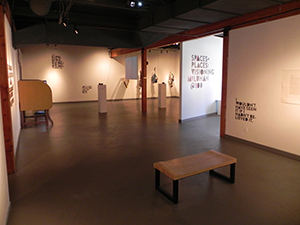
The University of Alberta is currently playing host to the Marshall McLuhan Edmonton Centenary, which celebrates the life and works of one of Edmonton's most influential and legendary scholars. As part of the celebrations, a new exhibition that brought artists from as far away as Paris has opened in Edmonton.
The exhibition, Spaces+PlacesVisioning McLuhan @ 100, features 10 multimedia pieces that explore our relationship to technology, a subject that McLuhan spent a good deal of his career writing about, says Aidan Rowe, U of A art and design researcher and curator for the show. However, whereas McLuhan concerned himself with the impact of technology such as television on the human mind, Rowe says technology continues to have a wider impact.
"McLuhan talks about how technology shapes us and how we're enthralled with it," said Rowe. "Historically, we think of technology as limited to industry but it has become a platform for art and design as well. The show presents a full range of the technological spectrum of art and design production, from traditional to technology mediated pieces." For example, the exhibit features an iChat conversation and another that allows users to use technology to rename an artwork.
Most of the works are interactive and use technologies such as television to covey McLuhan's nuanced views on the impact of technology. Rowe says artists have tried to make McLuhan's ideas more accessible.
"McLuhan is critical about the effects of technology and in some ways the show furthers his cynicism about the role and influence of technology," Rowe said. "This show provides an alternative entrance to his rich body of work that is so complex, and beyond just his texts."
It could be seen as bit of an irony to use technologies such as a television to project the ideas of McLuhan because of his terse cautions on technology, but Marco Adria, director of the Faculty of Extension's Master of Arts in Communications and Technology program and chair of the centenary celebrations, said McLuhan's criticism were not straightforward.
"Many of the things he said were contradictory," said Adria. "He never felt that the effects of television could be stopped. It was not his intention to provide a kind of counterweight to technology, but he wanted people to wake up from some of the illusions that media create."
"He never said television was good or bad, but gave us a chance to question the impact of the technology," says Rowe.
The exhibition, which runs until July 23, goes beyond highlighting the sometimes controversial thoughts and ideas of McLuhan. Rowe says the show also illustrates society's active and critical relationship to technology.
"We're not passive to technology, we consume it," said Rowe. "Something interesting has happened with the democratization of technology that has allowed us to do a lot by lowering the barrier of entry.
"We're now producers and there's something about our active engagement that provides us an opportunity to think about our relationship with technology."